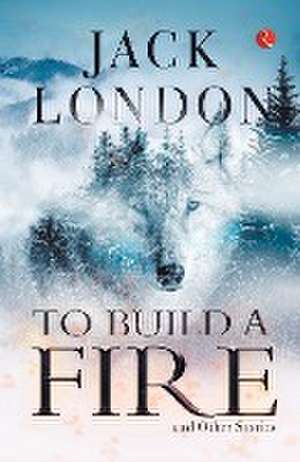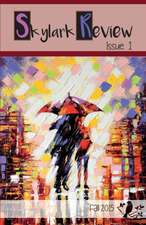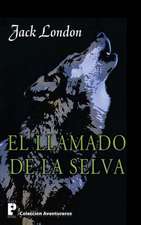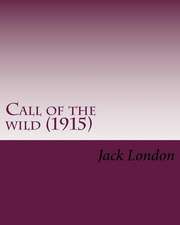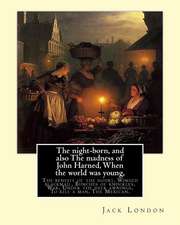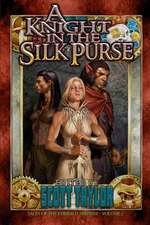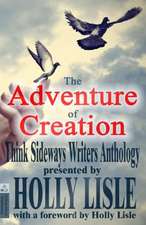To Build a Fire and Other Stories
Autor Jack Londonen Limba Engleză Paperback – 5 mai 2023
| Toate formatele și edițiile | Preț | Express |
|---|---|---|
| Paperback (4) | 32.84 lei 3-5 săpt. | +8.60 lei 7-13 zile |
| Bantam Classics – 31 mar 1986 | 32.84 lei 3-5 săpt. | +8.60 lei 7-13 zile |
| Digireads.com – 22 sep 2018 | 99.34 lei 6-8 săpt. | |
| Digireads.com – 31 dec 2007 | 109.48 lei 38-44 zile | |
| Rupa Publications India Pvt Ltd. – 5 mai 2023 | 132.31 lei 38-44 zile |
Preț: 132.31 lei
Nou
Puncte Express: 198
Preț estimativ în valută:
25.32€ • 26.50$ • 20.95£
25.32€ • 26.50$ • 20.95£
Carte tipărită la comandă
Livrare economică 01-07 aprilie
Preluare comenzi: 021 569.72.76
Specificații
ISBN-13: 9789357022194
ISBN-10: 9357022198
Pagini: 186
Dimensiuni: 129 x 198 x 10 mm
Greutate: 0.21 kg
Editura: Rupa Publications India Pvt Ltd.
ISBN-10: 9357022198
Pagini: 186
Dimensiuni: 129 x 198 x 10 mm
Greutate: 0.21 kg
Editura: Rupa Publications India Pvt Ltd.
Notă biografică
John Griffith "Jack" London (1876 - 1916) was an American novelist, journalist, and social activist. A pioneer in the then-burgeoning world of commercial magazine fiction, he was one of the first fiction writers to obtain worldwide celebrity and a large fortune from his fiction alone, including science fiction. Some of his most famous works include The Call of the Wild and White Fang, both set in the Klondike Gold Rush, as well as the short stories "To Build a Fire", "An Odyssey of the North", and "Love of Life". He also wrote of the South Pacific in such stories as "The Pearls of Parlay" and "The Heathen", and of the San Francisco Bay area in The Sea Wolf.
Extras
To the Man on Trail
“Dump it in."
"But I say, Kid, is n't that going it a little too strong? Whiskey and alcohol's bad enough: but when it comes to brandy and pepper-sauce and"–
"Dump it in. Who 's making this punch, anyway?" And Malemute Kid smiled benignantly through the clouds of steam. "By the time you've been in this country as long as I have, my son, and lived on rabbit-tracks and salmon-belly, you'll learn that Christmas comes only once per annum. And a Christmas without punch is sinking a hole to bedrock with nary a pay-streak."
"Stack up on that fer a high cyard," approved Big Jim Belden, who had come down from his claim on Mazy May to spend Christmas, and who, as every one knew, had been living the two months past on straight moose-meat. "Hain't fergot the hooch we-uns made on the Tanana, hev yeh?"
"Well, I guess yes. Boys, it would have done your hearts good to see that whole tribe fighting drunk–and all because of a glorious ferment of sugar and sour dough. That was before your time," Malemute Kid said as he turned to Stanley Prince, a young mining expert who had been in two years. "No white women in the country then, and Mason wanted to get married. Ruth's father was chief of the Tananas, and objected, like the rest of the tribe. Stiff? Why, I used my last pound of sugar; finest work in that line I ever did in my life. You should have seen the chase, down the river and across the portage."
"But the squaw?" asked Louis Savoy, the tall French-Canadian, becoming interested; for he had heard of this wild deed, when at Forty Mile the preceding winter.
Then Malemute Kid, who was a born raconteur, told the unvarnished tale of the Northland Lochinvar. More than one rough adventurer of the North felt his heartstrings draw closer, and experienced vague yearnings for the sunnier pastures of the Southland, where life promised something more than a barren struggle with cold and death.
"We struck the Yukon just behind the first ice-run," he concluded, "and the tribe only a quarter of an hour behind. But that saved us; for the second run broke the jam above and shut them out. When they finally got into Nuklukyeto, the whole Post was ready for them. And as to the foregathering, ask Father Roubeau here: he performed the ceremony."
The Jesuit took the pipe from his lips, but could only express his gratification with patriarchal smiles, while Protestant and Catholic vigorously applauded.
"By gar!" ejaculated Louis Savoy, who seemed overcome by the romance of it. "La petite squaw; mon Mason brav. By gar!"
Then, as the first tin cups of punch went round, Bettles the Unquenchable sprang to his feet and struck up his favorite drinking song:–
"There 's Henry Ward Beecher
And Sunday-school teachers,
All drink of the sassafras root;
But you bet all the same,
If it had its right name,
It 's the juice of the forbidden fruit."
"Oh the juice of the forbidden fruit,"
roared out the Bacchanalian chorus,–
"Oh the juice of the forbidden fruit:
But you bet all the same,
If it had its right name,
It's the juice of the forbidden fruit."
Malemute Kid's frightful concoction did its work; the men of the camps and trails unbent in its genial glow, and jest and song and tales of past adventure went round the board. Aliens from a dozen lands, they toasted each and all. It was the Englishman, Prince, who pledged "Uncle Sam, the precocious infant of the New World"; the Yankee, Bettles, who drank to "The Queen, God bless her"; and together, Savoy and Meyers, the German trader, clanged their cups to Alsace and Lorraine.
Then Malemute Kid arose, cup in hand, and glanced at the greased-paper window, where the frost stood full three inches thick. "A health to the man on trail this night; may his grub hold out; may his dogs keep their legs; may his matches never miss fire."
Crack! Crack!–they heard the familiar music of the dogwhip, the whining howl of the Malemutes, and the crunch of a sled as it drew up to the cabin. Conversation languished while they waited the issue.
"An old-timer; cares for his dogs and then himself," whispered Malemute Kid to Prince, as they listened to the snapping jaws and the wolfish snarls and yelps of pain which proclaimed to their practiced ears that the stranger was beating back their dogs while he fed his own.
Then came the expected knock, sharp and confident, and the stranger entered. Dazzled by the light, he hesitated a moment at the door, giving to all a chance for scrutiny. He was a striking personage, and a most picturesque one, in his Arctic dress of wool and fur. Standing six foot two or three, with proportionate breadth of shoulders and depth of chest, his smooth-shaven face nipped by the cold to a gleaming pink, his long lashes and eyebrows white with ice, and the ear and neck flaps of his great wolfskin cap loosely raised, he seemed, of a verity, the Frost King, just stepped in out of the night. Clasped outside his mackinaw jacket, a beaded belt held two large Colt's revolvers and a hunting-knife, while he carried, in addition to the inevitable dogwhip, a smokeless rifle of the largest bore and latest pattern. As he came forward, for all his step was firm and elastic, they could see that fatigue bore heavily upon him.
An awkward silence had fallen, but his hearty "What cheer, my lads?" put them quickly at ease, and the next instant Malemute Kid and he had gripped hands. Though they had never met, each had heard of the other, and the recognition was mutual. A sweeping introduction and a mug of punch were forced upon him before he could explain his errand.
"How long since that basket-sled, with three men and eight dogs, passed?" he asked.
"An even two days ahead. Are you after them?"
"Yes; my team. Run them off under my very nose, the cusses. I 've gained two days on them already,–pick them up on the next run."
"Reckon they 'll show spunk?" asked Belden, in order to keep up the conversation, for Malemute Kid already had the coffee-pot on and was busily frying bacon and moose-meat.
The stranger significantly tapped his revolvers.
"When 'd yeh leave Dawson?"
"Twelve o'clock."
"Last night?"–as a matter of course.
"To-day."
A murmur of surprise passed round the circle. And well it might; for it was just midnight, and seventy-five miles of rough river trail was not to be sneered at for a twelve hours' run.
The talk soon became impersonal, however, harking back to the trails of childhood. As the young stranger ate of the rude fare, Malemute Kid attentively studied his face. Nor was he long in deciding that it was fair, honest, and open, and that he liked it. Still youthful, the lines had been firmly traced by toil and hardship. Though genial in conversation, and mild when at rest, the blue eyes gave promise of the hard steel-glitter which comes when called into action, especially against odds. The heavy jaw and square-cut chin demonstrated rugged pertinacity and indomitability. Nor, though the attributes of the lion were there, was there wanting the certain softness, the hint of womanliness, which bespoke the emotional nature.
"So thet 's how me an' the ol' woman got spliced," said Belden, concluding the exciting tale of his courtship. " 'Here we be, dad,' sez she. 'An' may yeh be damned,' sez he to her, an' then to me, 'Jim, yeh–yeh git outen them good duds o' yourn; I want a right peart slice o' thet forty acre ploughed 'fore dinner.' An' then he turns on her an' sez, 'An' yeh, Sal; yeh sail inter them dishes.' An' then he sort o' sniffled an' kissed her. An' I was thet happy,–but he seen me an' roars out, 'Yeh, Jim!' An' yeh bet I dusted fer the barn."
"Any kids waiting for you back in the States?" asked the stranger.
"Nope; Sal died 'fore any come. Thet 's why I 'm here." Belden abstractedly began to light his pipe, which had failed to go out, and then brightened up with, "How 'bout yerself, stranger,–married man?"
For reply, he opened his watch, slipped it from the thong which served for a chain, and passed it over. Belden pricked up the slush-lamp, surveyed the inside of the case critically, and swearing admiringly to himself, handed it over to Louis Savoy. With numerous "By gars!" he finally surrendered it to Prince, and they noticed that his hands trembled and his eyes took on a peculiar softness. And so it passed from horny hand to horny hand–the pasted photograph of a woman, the clinging kind that such men fancy, with a babe at the breast. Those who had not yet seen the wonder were keen with curiosity; those who had, became silent and retrospective. They could face the pinch of famine, the grip of scurvy, or the quick death by field or flood; but the pictured semblance of a stranger woman and child made women and children of them all.
"Never have seen the youngster yet,–he 's a boy, she says, and two years old," said the stranger as he received the treasure back. A lingering moment he gazed upon it, then snapped the case and turned away, but not quick enough to hide the restrained rush of tears.
Malemute Kid led him to a bunk and bade him turn in.
"Call me at four, sharp. Don't fail me," were his last words, and a moment later he was breathing in the heaviness of exhausted sleep.
"By Jove! he 's a plucky chap," commented Prince. "Three hours' sleep after seventy-five miles with the dogs, and then the trail again. Who is he, Kid?"
"Jack Westondale. Been in going on three years, with nothing but the name of working like a horse, and any amount of bad luck to his credit. I never knew him, but Sitka Charley told me about him."
"It seems hard that a man with a sweet young wife like his should be putting in his years in this God-forsaken hole, where every year counts two on the outside."
"The trouble with him is clean grit and stubbornness. He 's cleaned up twice with a stake, but lost it both times."
Here the conversation was broken off by an uproar from Bettles, for the effect had begun to wear away. And soon the bleak years of monotonous grub and deadening toil were being forgotten in rough merriment. Malemute Kid alone seemed unable to lose himself, and cast many an anxious look at his watch. Once he put on his mittens and beaver-skin cap, and leaving the cabin, fell to rummaging about in the cache.
Nor could he wait the hour designated; for he was fifteen minutes ahead of time in rousing his guest. The young giant had stiffened badly, and brisk rubbing was necessary to bring him to his feet. He tottered painfully out of the cabin, to find his dogs harnessed and everything ready for the start. The company wished him good luck and a short chase, while Father Roubeau, hurriedly blessing him, led the stampede for the cabin; and small wonder, for it is not good to face seventy-four degrees below zero with naked ears and hands.
Malemute Kid saw him to the main trail, and there, gripping his hand heartily, gave him advice.
"You 'll find a hundred pounds of salmon-eggs on the sled," he said. "The dogs will go as far on that as with one hundred and fifty of fish, and you can't get dog-food at Pelly, as you probably expected." The stranger started, and his eyes flashed, but he did not interrupt. "You can't get an ounce of food for dog or man till you reach Five Fingers, and that 's a stiff two hundred miles. Watch out for open water on the Thirty Mile River, and be sure you take the big cut-off above Le Barge."
"How did you know it? Surely the news can't be ahead of me already?"
"I don't know it; and what 's more, I don't want to know it. But you never owned that team you 're chasing. Sitka Charley sold it to them last spring. But he sized you up to me as square once, and I believe him. I 've seen your face; I like it. And I've seen–why, damn you, hit the high places for salt water and that wife of yours, and"–Here the Kid unmittened and jerked out his sack.
"No; I don't need it," and the tears froze on his cheeks as he convulsively gripped Malemute Kid's hand.
"Then don't spare the dogs; cut them out of the traces as fast as they drop; buy them, and think they 're cheap at ten dollars a pound. You can get them at Five Fingers, Little Salmon, and the Hootalinqua. And watch out for wet feet," was his parting advice. "Keep a-traveling up to twenty-five, but if it gets below that, build a fire and change your socks."
Fifteen minutes had barely elapsed when the jingle of bells announced new arrivals. The door opened, and a mounted policeman of the Northwest Territory entered, followed by two half-breed dog-drivers. Like Westondale, they were heavily armed and showed signs of fatigue. The half-breeds had been born to the trail, and bore it easily; but the young policeman was badly exhausted. Still, the dogged obstinacy of his race held him to the pace he had set, and would hold him till he dropped in his tracks.
"When did Westondale pull out?" he asked. "He stopped here, did n't he?" This was supererogatory, for the tracks told their own tale too well.
Malemute Kid had caught Belden's eye, and he, scenting the wind, replied evasively, "A right peart while back."
"Come, my man; speak up," the policeman admonished.
"Yeh seem to want him right smart. Hez he ben gittin' cantankerous down Dawson way?"
"Held up Harry McFarland's for forty thousand; exchanged it at the P. C. store for a check on Seattle; and who's to stop the cashing of it if we don't overtake him? When did he pull out?"
Every eye suppressed its excitement, for Malemute Kid had given the cue, and the young officer encountered wooden faces on every hand.
Striding over to Prince, he put the question to him. Though it hurt him, gazing into the frank, earnest face of his fellow countryman, he replied inconsequentially on the state of the trail.
Then he espied Father Roubeau, who could not lie. "A quarter of an hour ago," the priest answered; "but he had four hours' rest for himself and dogs."
"Fifteen minutes' start, and he 's fresh! My God!" The poor fellow staggered back, half fainting from exhaustion and disappointment, murmuring something about the run from Dawson in ten hours and the dogs being played out.
“Dump it in."
"But I say, Kid, is n't that going it a little too strong? Whiskey and alcohol's bad enough: but when it comes to brandy and pepper-sauce and"–
"Dump it in. Who 's making this punch, anyway?" And Malemute Kid smiled benignantly through the clouds of steam. "By the time you've been in this country as long as I have, my son, and lived on rabbit-tracks and salmon-belly, you'll learn that Christmas comes only once per annum. And a Christmas without punch is sinking a hole to bedrock with nary a pay-streak."
"Stack up on that fer a high cyard," approved Big Jim Belden, who had come down from his claim on Mazy May to spend Christmas, and who, as every one knew, had been living the two months past on straight moose-meat. "Hain't fergot the hooch we-uns made on the Tanana, hev yeh?"
"Well, I guess yes. Boys, it would have done your hearts good to see that whole tribe fighting drunk–and all because of a glorious ferment of sugar and sour dough. That was before your time," Malemute Kid said as he turned to Stanley Prince, a young mining expert who had been in two years. "No white women in the country then, and Mason wanted to get married. Ruth's father was chief of the Tananas, and objected, like the rest of the tribe. Stiff? Why, I used my last pound of sugar; finest work in that line I ever did in my life. You should have seen the chase, down the river and across the portage."
"But the squaw?" asked Louis Savoy, the tall French-Canadian, becoming interested; for he had heard of this wild deed, when at Forty Mile the preceding winter.
Then Malemute Kid, who was a born raconteur, told the unvarnished tale of the Northland Lochinvar. More than one rough adventurer of the North felt his heartstrings draw closer, and experienced vague yearnings for the sunnier pastures of the Southland, where life promised something more than a barren struggle with cold and death.
"We struck the Yukon just behind the first ice-run," he concluded, "and the tribe only a quarter of an hour behind. But that saved us; for the second run broke the jam above and shut them out. When they finally got into Nuklukyeto, the whole Post was ready for them. And as to the foregathering, ask Father Roubeau here: he performed the ceremony."
The Jesuit took the pipe from his lips, but could only express his gratification with patriarchal smiles, while Protestant and Catholic vigorously applauded.
"By gar!" ejaculated Louis Savoy, who seemed overcome by the romance of it. "La petite squaw; mon Mason brav. By gar!"
Then, as the first tin cups of punch went round, Bettles the Unquenchable sprang to his feet and struck up his favorite drinking song:–
"There 's Henry Ward Beecher
And Sunday-school teachers,
All drink of the sassafras root;
But you bet all the same,
If it had its right name,
It 's the juice of the forbidden fruit."
"Oh the juice of the forbidden fruit,"
roared out the Bacchanalian chorus,–
"Oh the juice of the forbidden fruit:
But you bet all the same,
If it had its right name,
It's the juice of the forbidden fruit."
Malemute Kid's frightful concoction did its work; the men of the camps and trails unbent in its genial glow, and jest and song and tales of past adventure went round the board. Aliens from a dozen lands, they toasted each and all. It was the Englishman, Prince, who pledged "Uncle Sam, the precocious infant of the New World"; the Yankee, Bettles, who drank to "The Queen, God bless her"; and together, Savoy and Meyers, the German trader, clanged their cups to Alsace and Lorraine.
Then Malemute Kid arose, cup in hand, and glanced at the greased-paper window, where the frost stood full three inches thick. "A health to the man on trail this night; may his grub hold out; may his dogs keep their legs; may his matches never miss fire."
Crack! Crack!–they heard the familiar music of the dogwhip, the whining howl of the Malemutes, and the crunch of a sled as it drew up to the cabin. Conversation languished while they waited the issue.
"An old-timer; cares for his dogs and then himself," whispered Malemute Kid to Prince, as they listened to the snapping jaws and the wolfish snarls and yelps of pain which proclaimed to their practiced ears that the stranger was beating back their dogs while he fed his own.
Then came the expected knock, sharp and confident, and the stranger entered. Dazzled by the light, he hesitated a moment at the door, giving to all a chance for scrutiny. He was a striking personage, and a most picturesque one, in his Arctic dress of wool and fur. Standing six foot two or three, with proportionate breadth of shoulders and depth of chest, his smooth-shaven face nipped by the cold to a gleaming pink, his long lashes and eyebrows white with ice, and the ear and neck flaps of his great wolfskin cap loosely raised, he seemed, of a verity, the Frost King, just stepped in out of the night. Clasped outside his mackinaw jacket, a beaded belt held two large Colt's revolvers and a hunting-knife, while he carried, in addition to the inevitable dogwhip, a smokeless rifle of the largest bore and latest pattern. As he came forward, for all his step was firm and elastic, they could see that fatigue bore heavily upon him.
An awkward silence had fallen, but his hearty "What cheer, my lads?" put them quickly at ease, and the next instant Malemute Kid and he had gripped hands. Though they had never met, each had heard of the other, and the recognition was mutual. A sweeping introduction and a mug of punch were forced upon him before he could explain his errand.
"How long since that basket-sled, with three men and eight dogs, passed?" he asked.
"An even two days ahead. Are you after them?"
"Yes; my team. Run them off under my very nose, the cusses. I 've gained two days on them already,–pick them up on the next run."
"Reckon they 'll show spunk?" asked Belden, in order to keep up the conversation, for Malemute Kid already had the coffee-pot on and was busily frying bacon and moose-meat.
The stranger significantly tapped his revolvers.
"When 'd yeh leave Dawson?"
"Twelve o'clock."
"Last night?"–as a matter of course.
"To-day."
A murmur of surprise passed round the circle. And well it might; for it was just midnight, and seventy-five miles of rough river trail was not to be sneered at for a twelve hours' run.
The talk soon became impersonal, however, harking back to the trails of childhood. As the young stranger ate of the rude fare, Malemute Kid attentively studied his face. Nor was he long in deciding that it was fair, honest, and open, and that he liked it. Still youthful, the lines had been firmly traced by toil and hardship. Though genial in conversation, and mild when at rest, the blue eyes gave promise of the hard steel-glitter which comes when called into action, especially against odds. The heavy jaw and square-cut chin demonstrated rugged pertinacity and indomitability. Nor, though the attributes of the lion were there, was there wanting the certain softness, the hint of womanliness, which bespoke the emotional nature.
"So thet 's how me an' the ol' woman got spliced," said Belden, concluding the exciting tale of his courtship. " 'Here we be, dad,' sez she. 'An' may yeh be damned,' sez he to her, an' then to me, 'Jim, yeh–yeh git outen them good duds o' yourn; I want a right peart slice o' thet forty acre ploughed 'fore dinner.' An' then he turns on her an' sez, 'An' yeh, Sal; yeh sail inter them dishes.' An' then he sort o' sniffled an' kissed her. An' I was thet happy,–but he seen me an' roars out, 'Yeh, Jim!' An' yeh bet I dusted fer the barn."
"Any kids waiting for you back in the States?" asked the stranger.
"Nope; Sal died 'fore any come. Thet 's why I 'm here." Belden abstractedly began to light his pipe, which had failed to go out, and then brightened up with, "How 'bout yerself, stranger,–married man?"
For reply, he opened his watch, slipped it from the thong which served for a chain, and passed it over. Belden pricked up the slush-lamp, surveyed the inside of the case critically, and swearing admiringly to himself, handed it over to Louis Savoy. With numerous "By gars!" he finally surrendered it to Prince, and they noticed that his hands trembled and his eyes took on a peculiar softness. And so it passed from horny hand to horny hand–the pasted photograph of a woman, the clinging kind that such men fancy, with a babe at the breast. Those who had not yet seen the wonder were keen with curiosity; those who had, became silent and retrospective. They could face the pinch of famine, the grip of scurvy, or the quick death by field or flood; but the pictured semblance of a stranger woman and child made women and children of them all.
"Never have seen the youngster yet,–he 's a boy, she says, and two years old," said the stranger as he received the treasure back. A lingering moment he gazed upon it, then snapped the case and turned away, but not quick enough to hide the restrained rush of tears.
Malemute Kid led him to a bunk and bade him turn in.
"Call me at four, sharp. Don't fail me," were his last words, and a moment later he was breathing in the heaviness of exhausted sleep.
"By Jove! he 's a plucky chap," commented Prince. "Three hours' sleep after seventy-five miles with the dogs, and then the trail again. Who is he, Kid?"
"Jack Westondale. Been in going on three years, with nothing but the name of working like a horse, and any amount of bad luck to his credit. I never knew him, but Sitka Charley told me about him."
"It seems hard that a man with a sweet young wife like his should be putting in his years in this God-forsaken hole, where every year counts two on the outside."
"The trouble with him is clean grit and stubbornness. He 's cleaned up twice with a stake, but lost it both times."
Here the conversation was broken off by an uproar from Bettles, for the effect had begun to wear away. And soon the bleak years of monotonous grub and deadening toil were being forgotten in rough merriment. Malemute Kid alone seemed unable to lose himself, and cast many an anxious look at his watch. Once he put on his mittens and beaver-skin cap, and leaving the cabin, fell to rummaging about in the cache.
Nor could he wait the hour designated; for he was fifteen minutes ahead of time in rousing his guest. The young giant had stiffened badly, and brisk rubbing was necessary to bring him to his feet. He tottered painfully out of the cabin, to find his dogs harnessed and everything ready for the start. The company wished him good luck and a short chase, while Father Roubeau, hurriedly blessing him, led the stampede for the cabin; and small wonder, for it is not good to face seventy-four degrees below zero with naked ears and hands.
Malemute Kid saw him to the main trail, and there, gripping his hand heartily, gave him advice.
"You 'll find a hundred pounds of salmon-eggs on the sled," he said. "The dogs will go as far on that as with one hundred and fifty of fish, and you can't get dog-food at Pelly, as you probably expected." The stranger started, and his eyes flashed, but he did not interrupt. "You can't get an ounce of food for dog or man till you reach Five Fingers, and that 's a stiff two hundred miles. Watch out for open water on the Thirty Mile River, and be sure you take the big cut-off above Le Barge."
"How did you know it? Surely the news can't be ahead of me already?"
"I don't know it; and what 's more, I don't want to know it. But you never owned that team you 're chasing. Sitka Charley sold it to them last spring. But he sized you up to me as square once, and I believe him. I 've seen your face; I like it. And I've seen–why, damn you, hit the high places for salt water and that wife of yours, and"–Here the Kid unmittened and jerked out his sack.
"No; I don't need it," and the tears froze on his cheeks as he convulsively gripped Malemute Kid's hand.
"Then don't spare the dogs; cut them out of the traces as fast as they drop; buy them, and think they 're cheap at ten dollars a pound. You can get them at Five Fingers, Little Salmon, and the Hootalinqua. And watch out for wet feet," was his parting advice. "Keep a-traveling up to twenty-five, but if it gets below that, build a fire and change your socks."
Fifteen minutes had barely elapsed when the jingle of bells announced new arrivals. The door opened, and a mounted policeman of the Northwest Territory entered, followed by two half-breed dog-drivers. Like Westondale, they were heavily armed and showed signs of fatigue. The half-breeds had been born to the trail, and bore it easily; but the young policeman was badly exhausted. Still, the dogged obstinacy of his race held him to the pace he had set, and would hold him till he dropped in his tracks.
"When did Westondale pull out?" he asked. "He stopped here, did n't he?" This was supererogatory, for the tracks told their own tale too well.
Malemute Kid had caught Belden's eye, and he, scenting the wind, replied evasively, "A right peart while back."
"Come, my man; speak up," the policeman admonished.
"Yeh seem to want him right smart. Hez he ben gittin' cantankerous down Dawson way?"
"Held up Harry McFarland's for forty thousand; exchanged it at the P. C. store for a check on Seattle; and who's to stop the cashing of it if we don't overtake him? When did he pull out?"
Every eye suppressed its excitement, for Malemute Kid had given the cue, and the young officer encountered wooden faces on every hand.
Striding over to Prince, he put the question to him. Though it hurt him, gazing into the frank, earnest face of his fellow countryman, he replied inconsequentially on the state of the trail.
Then he espied Father Roubeau, who could not lie. "A quarter of an hour ago," the priest answered; "but he had four hours' rest for himself and dogs."
"Fifteen minutes' start, and he 's fresh! My God!" The poor fellow staggered back, half fainting from exhaustion and disappointment, murmuring something about the run from Dawson in ten hours and the dogs being played out.
Textul de pe ultima copertă
The most comprehensive and wide-ranging collection of Jack London's short stories available in paperback. This superb volume brings together twenty-five of London's finest.
